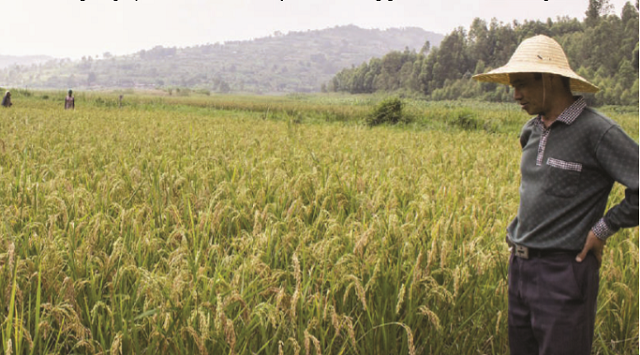
Nairobi, Kenya | Xinhua | Large-scale adoption of hybrid rice that has proved effective in withstanding climatic stresses, as well as pests and diseases, is paramount in order to tackle Africa’s hunger and malnutrition crisis, scientists said Friday.
Emmanuel Okogbenin, for programme development and commercialisation at African Agricultural Technology Foundation (AATF), noted that the introduction of improved rice varieties will boost food security and tackle rural poverty in the continent.
“We are encouraging farmers to adopt hybrid rice whose yield levels are high, is adaptable to different ecologies, and is key to food security and improved incomes for rural communities,” Okogbenin said.
He spoke during a tour of the Mwea irrigation scheme in central Kenya where AATF has facilitated the introduction of hybrid rice to test its resilience in the face of extreme weather events, invasive pests, and diseases.
According to Okogbenin, hybrid rice that has been introduced in central Kenya has registered a doubling of yields at the small-holder level besides boosting the socioeconomic status of farmers.
He stressed that the unfolding climate crisis in Africa coupled with the spread of voracious pests, diseases, and loss of soil fertility calls for a shift from conventional to improved rice varieties.
Sheila Ochugboju, the Executive Director of the Alliance for Science called upon African governments, research institutions, and industry to facilitate the deployment of improved rice varieties to small-holder farmers as part of climate adaptation in the agriculture sector.
Ochugboju added that extension services in Africa should be revamped to help farmers access information, improved seeds, fertilizer, and modern post-harvest storage facilities.
She noted that hybrid rice is not only climate smart but is also rich in nutrients and ideal for tackling growing micronutrient deficiency among children in the continent.
Ochugboju said that friendly policies and regulations, farmers’ training, and investments in modern storage facilities will be key to spurring greater adoption of hybrid rice in Africa.
 The Independent Uganda: You get the Truth we Pay the Price
The Independent Uganda: You get the Truth we Pay the Price



